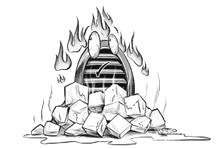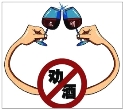题目内容
【题目】阅读下面短文,掌握其大意,然后从各题所给的A、B、C和D项中,选出最佳选项。 
The British people love talking about the weather. This hot summer, Europe was caught in the heat wave, and many parts of China were also been struggling with record-breaking temperatures. Therefore, there’s plenty for the British people to
get excited about.
But beside from a simple“hot”, what other ways are there to describe the summer heat? Apart from phrases like“boiling hot”, there are many interesting expressions that relate to unbearably hot weather.
Dog days of summer
In books and newspaper articles, the period from early July to mid-August is often referred to as the“dog days of summer”. Some think the expression means the weather is so hot that dogs go wild. But in fact, the expression comes from 16 th century and refers to the days on which Sirius(天狼星)—the Dog Star—rises at the same time as the sun. The Romans associated the hot weather with this star and would sacrifice a dog every year in April to stop the anger of Sirius.
So hot you can fry an egg on the sidewalk
This expression needs no explanation and although its origin is unclear, it hasn’t stopped thousands of curious tourists from testing if the saying is true, with the result that sidewalks in Death Valley, California—the hottest place in the US—are now littered with broken eggshells. Early in July, the local government asked tourists to stop their cooking experiments. Even so, it is actually possible to fry an egg on the sidewalk, so long as you use a frying pan with a lid and the temperature is at least 49℃.
(1)What’s the main idea of the passage?
A.Some expressions about hot weather.
B.The heat wave in the world.
C.Sirius is associated with the hot weather.
D.Death Valley—the hottest place in the US.
(2)According to the passage, how long does“dog days of summer”last?
A.About one month.
B.About two months.
C.About two months and a half.
D.About one month and a half.
(3)What caused broken eggshells littered around sidewalks in Death Valley?
A.The hot weather.
B.The curiosity of tourists.
C.The permission of the local government.
D.The origin of the expression.
(4)Which of the following is NOT necessary to test the last expression about hot weather?
A.On the sidewalk.
B.A frying pan with a lid.
C.The temperature(≥49℃).
D.In the hottest place.
【答案】
(1)A
(2)D
(3)B
(4)D
【解析】(1)主旨大意题。文中第一段以幽默的方式介绍了今年夏天全球的热浪, 其目的是引出本文的中心, 故B项错误; 第二段的最后一句话是整篇文章的主题句, 故A项正确; C、D两项都是文 章中的一部分, 范围小了。(2)细节理解题。由第三段的第一句In books and newspaper articles, the period from early July to mid-August is often referred to as the“dog days of summer”. 可知“dog days of summer”持续大约一个半月。(3)推理判断题。由最后一段可以看出好奇的游客为了验证当地的酷热是否能够“fry an egg on the sidewalk”, 不顾当地政府的告诫, 仍然坚持做这项实验, 故B项正确。(4)推理判断题。文章中提到的关于热浪的最后一个习语是“So hot you can fry an egg on the sidewalk”, 故A项是一个必要条件; 由最后一段的最后一句可知B、C是必要条件; D项范围太大。

 阅读快车系列答案
阅读快车系列答案






